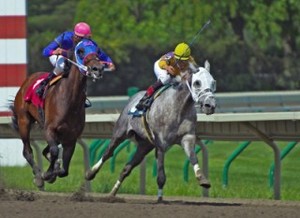Resting Racehorses

Your humble reporter lives on a horse farm, and many of our equine friends compete on a regular basis, so we are always interested in anything to keep them fit, healthy and happy.
I was interested to see a report of some research done in Finland. The main carbohydrate store in muscle is called glycogen, and Seppo Hyyppä, from MTT Agrifood Research Finland, looked at the way in which muscle glycogen stores are rebuilt after exercise. This is an important question, and not only for horses: glycogen is the most important nutrient during exercise and if glycogen stores are depleted the horse breaks down the protein in its own muscles to provide energy. So if the horse is chronically over-exercised it can hurt him.
The two most important factors in rebuilding muscle glycogen were:
- Sufficient recovery time between intense training periods, and
- Hydration
Giving horses an isotonic glucose-electrolyte rehydration solution soon after exercise helps to overcome dehydration significantly better than providing them with plain water.
The research also showed that weighing the horse before and after exercise gave a reasonably accurate estimate of the rate at which glycogen was being replenished. If you don’t have a set of weighing scales handy, you can measure the horse’s chest circumference.
The research also confirmed what every horse owner knows: you can tell a lot by looking at a horse: his general alertness and, for example, suppleness and appetite, indicate that he is in good condition.
“A canter is the cure for every evil.”
–Benjamin Disraeli, 1st Earl of Beaconsfield (English Statesman, Novelist and, in 1868 and from 1874-1880, British Prime Minister, 1804-1881)
“A man on a horse is spiritually as well as physically bigger than a man on foot.”
–John Steinbeck (American Writer and, in 1962, Winner of the Nobel Prize in Literature, 1902-1968)






